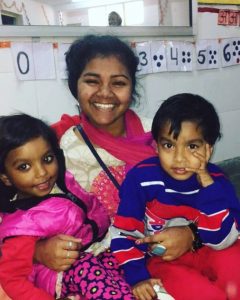
Mar 9, 2017 | Opinion |
By Courtney Fowler, President

(Photo Courtesy of Amazon)
Okay, I’ll be honest here: I’m already deceiving you with this title. For most, writing a book review would require curling up with a great novel, probably with the smell of dusty pages filling the air around them, as they contemplate the deep life lessons and analyze the complex characters that fill the pages. Don’t get me wrong, that sounds lovely, but sadly, who has time for that anymore? So let’s start off by renaming the title to more accurately describe what I did here – “Kindle Single Review: Crazy Stupid Money.”
For those who don’t know, a Kindle Single is probably the best thing ever created – a short, quick read that serves as the perfect excuse to take a break from studying for your test. They’re even better for those of you who like to read but can hardly commit to finding the time to read a 500+ page book. I’m right there with you, don’t worry. Most of the Kindle Singles are free if you have Amazon Prime or Amazon Student, so even if you’re not loving “Crazy Stupid Money,” one of them surely will catch your attention. So, with my spiel on Kindle Single complete, let’s jump into what I am actually supposed to be doing here: reviewing a fabulous short story by Rachel Shukert.
How do you define yourself in this crazy world? Hopefully not by your appearance or the material items that have piled up in your dorm room or apartment over the years. Maybe you view and judge yourself based upon your education level or occupation, feeling most successful when you land an interview at your dream workplace or most likely, on your college graduation day.
These characteristics are certainly notable, but what about money? Are you more likable, more successful, or happier if you have more money? At the center of her book, Shukert discussed the one thing we avoid in most conversations: the importance of money not only as we struggle to survive, but in the process of navigating relationships with those around us.
In one highly applicable tale, particularly for my fellow classmates who, like me, are swimming in mounds of debt that we owe for our college education, Shukert speaks to her struggle of barely having enough money to pay her monthly rent of $3,400. Let’s all take a minute to appreciate the comparatively low rents in Farmington, but the significance still applies.
What stood out was not her struggle to earn money through her freelance writing career, but how such a lack of money made her feel: insignificant, worthless, and desperate. Though Shukert apparently had enough money to continue to order food each night for dinner (I’m a horrible cook too, so this is mildly understandable), her lack of substantial money tore apart her relationship, causing anxiety and a constant sense of frustration. Money certainly cannot buy happiness, but can it make our lives just a little more carefree?
Throughout her short story, Shukert grasps reader’s attention with her wit and humor, while managing to discuss the tricky “adult” topic of how to navigate the world with little income. It is the honesty and bravery of her work that is truly compelling, as she shares deep emotions that many of us fear to examine ourselves. Though masked with a comical storyline that will keep you laughing and engaged, Shukert addresses topics that many of us lack the confidence to face on our own.
This read will be a quick one for you (see: Kindle Single definition, above), but one that you certainly should not pass up. I can always appreciate a book that will make me literally laugh out loud, but more than this, one where I respect the author for her bold and raw emotional tales. Shukert not only exposes herself through her examination of money, power, and love, but will make you ponder the ever-persisting question – “Will I be a better, happier person when I earn more money in the future?”

Mar 9, 2017 | Feature |
By Nick Bray, Staff Reporter

The lobster tag belonging to Coneth Murray (Photo Courtesy of Caroline Farrell).
A lobster trap tag originating in Southport, Maine was recently found on a beach in Kerry, Ireland. The tag belonged to Coneth Murray, a lifelong lobsterman. Murray is the grandfather of Jess Murray, a senior at UMF.
Facebook has helped create a global lost and found, where objects which drift across the Atlantic ocean can be returned to their rightful owner with ease. The typical beachcomber might discover many artifacts from the fishing industry, and disregard them as they are so ubiquitous.
But Caroline Farrell wasn’t so quick to dismiss the common item when she came across the Mainer’s tag last month. Farrell was walking on Glenbeigh beach in Kerry with her boyfriend when they spotted the tag.
“My boyfriend does beachcombing from time to time,” Farrell said. “He has a keen eye and knows where to look for things on the beach.” Something orange caught Farrell’s eye, she picked it up and her boyfriend explained to her that it was a lobster trap tag. She immediately noticed the name Coneth Murray, printed on the tag. She was intrigued as her grandmother was a Murray and she wondered if there was any relation to this Murray.
Her boyfriend had found these tags in the past and recommended that Farrell post an image of the trap tag on the “Lost at Sea” Facebook group to find out if anyone had a connection to Coneth Murray. “Lost at Sea” is a page where people from across the world post images of things they find washed up on the beach. The group has over 6,000 members posting anything from messages in a bottle, to coins, fishing equipment, and unknown objects that users post in hopes of having the community identify the object.

A map showing the journey of the lobster tag. (Photo Courtesy of Nick Bray)
It was within hours of Farrell posting the trap tag that Jess Murray found it, and contacted Farrell. Murray’s cousin was a member of the “Lost at Sea” page and noticed Farrell’s post just hours earlier in the day. “I just clicked on her name and messaged her,” Murray said. Murray explained to Farrell that her grandfather stopped lobstering in 2001, and passed away in 2009. That means that the lobster tag was likely lost at sea for at least 16 years, if not longer.
Murray comes from a long line of lobstermen. Both her father and grandfather have been lifelong fisherman. “My grandfather lived and breathed lobstering,” Murray said. Coneth Murray was the captain and owner of the Donna Marie, the lobster boat he named after his wife. Murray’s family were very surprised to hear about this find. “My grandmother cried,” Murray said. Farrell said that she will be mailing the tag out as soon as she could and Murray will be receiving it soon.
Murray’s family is of Irish ancestry, and her parents plan on visiting Ireland this summer. They intend on visiting Glenbeigh beach where the tag was found, 2,700 miles away from Southport. The warm waters of the Gulf Stream current pass along the coast of the eastern United States, and crosses the Atlantic ocean becoming the North Atlantic current, eventually passing along the west coast of Ireland, where Glenbeigh beach is located. The tag likely become detached from Coneth Murray’s trap almost two decades ago, became lost at sea for some time, travelled with the current, resurfaced in Ireland, and is now returning to Maine after a very long journey.

Mar 9, 2017 | News |
By Angel Greer, Contributing Writer

Tyler Daigle with his fiancée, Gabrielle Severance. (Photo Courtesy of Gabrielle Severance)
Tyler Daigle, a senior history major at UMF passed away February 27th from complications related to Duchenne Muscular Dystrophy.
Duchenne Muscular Dystrophy is a genetic disorder that causes the muscles to weaken due to an absence of dystrophin, a protein that helps keep muscle cells intact. This disorder primarily affects males and progresses over time.
“Tyler was diagnosed at the age of five. He was able to walk up until he was ten. It affected every muscle in his body, including his heart,” said Tyler’s fiancée, Gabrielle Severance. Muscle weakness can begin as early as age 3, first affecting the shoulders and upper arm muscles and the muscles of the hips and thighs. By the early teens, the heart and respiratory muscles are also affected. “In the end, he was losing the use of his arms, but this didn’t stop him. He continued to go to school and complete assignments until the end,” said Severance.
“Tyler was 23 and he was a senior on his way to graduate,” said Sam O’Neal, Tyler’s CA this past year. “He was almost there. He was a smart cookie, a very smart cookie.” Tyler always knew what he wanted and did not hesitate to pursue it.
“Tyler’s favorite subject was history. He was working towards a degree in history with a minor in anthropology and political science,” said Severance.
“I loved having him in class primarily because he was so expressive,” said Nicole Kellett, Tyler’s Latin America and Anthropology professor. “I could always tell if I struck a chord with the students because Tyler would often throw his head back in laughter or shake his head back and forth in disbelief, or perhaps amazement, of what we were discussing in class,” said Kellett.
During February break, O’Neal had received a message from Susan Grace, Tyler’s mom, about him being admitted to the Hospice House in Auburn. “She didn’t really tell us much; besides that, everything was hopeful,” said O’Neal. “Everyone in Tyler’s hall and every CA in Scott itself signed a card and sent it to him while he was admitted.”
Not only was Tyler smart, but he was also kind, funny, and a great listener. “I know you kinda say this about everybody, but he was so impossibly kind to anybody…anybody and everybody that he met. Whenever he would talk you would just listen to him,” said O’Neal. “Everything he said just kinda made sense. He was very good at conversation. He loved listening to your stupid stories and he would laugh right along with you,” said O’Neal.
Tyler was strong-willed, self-sufficient, and an independent person, even while being wheelchair bound. “It didn’t matter that he was in a wheelchair because it didn’t seem like he was. He was way more independent than I’ll ever be,” said O’Neal.
“He swore that if he could walk, he’d be a wrestler,” said Severance. Tyler was a huge fan of the WWE. “He knew everyone that was in it and every move, and made up his own. He also wanted to start up a Wrestling Club,” said O’Neal. Tyler has always been actively involved here on campus and was part of a few clubs, in addition to always attending events held at the Landing.
“Tyler made UMF a better place,” said Kellett, “and I’m so grateful he chose to spend many of his formative years with us.”

Mar 9, 2017 | News |
By Sofia Vanoli, Contributing Writer

UMF students traveling to Guatemala with Safe Passage (Photo Courtesy of Blair Bailey).
A group of 12 students, seven from UMF, along with two members of the Farmington Rotary Club visited Guatemala from Feb 20-26 as part of the Safe Passage program.
Safe Passage (Camino Seguro in Spanish) is a nonprofit organization that fosters the education and good health of children from the Guatemala City Garbage Dump community.
It is not the first time the Farmington Rotary Club has arranged this trip to Guatemala City. This time they decided to extend the invitation to all members of the community to be part of the Support Team.
Doug Ibarguen, the Executive Secretary of the Farmington Rotary Club, participated in the trip and said that “The children and families of Safe Passage benefit from the Support Team visit by realizing that there are even more people who see them as being worthwhile members of the global family.”
“The main building inside the Safe Passage premises is called La Escuelita (the little school) and it is where the kids have their classes,” said Sarah Carlson, a sophomore majoring in special education, “so we helped them there and during the English classes.”
During their time in Safe Passage, the student travelers from UMF could experience firsthand the life of children who come from very poor families and attend school.
Samuel Carignan, who is a junior and an elementary education major, fondly remembered his time in Guatemala with a big smile on his face. “However,” Carignan said, “One of the things I was most taken aback by was that despite the poverty and the life they knew they would probably live, they were still so full of joy.”
“School just made their home,” Carignan said. “Students are self-motivated, which is something you don’t see in the U.S.”
The students who traveled to Guatemala all share their passion for service and global responsibility and had the desire of putting that into practice.
Hannah Somes, a senior majoring in elementary education, said that this was a positive experience because it made her think about teaching internationally.
According to Somes, this was an eye-opening opportunity. “We learned how to see a kid as a kid no matter their background,” she said, “It made me aware of my own kind of privileges.”
The trip also had a hint of adventure when students were able to hike the active volcano Pacaya, which erupted two days before they left Guatemala. Blair Bailey, a junior majoring in elementary education, described this adventure as unique and something she would not have done in the U.S.
Many of the student volunteers returned from the trip eager to do more and spread the word about their experience. They have developed a desire to drive change and promote accessible education to children in third world countries like Guatemala.
“We’ve learned from those kids that we have more than we need, so we had the idea of having a yard sale to collect money for Safe Passage,” said Somes.
Carignan felt that he learned from this trip more than what he had expected. “You don’t have to do big things to make big changes,” he concluded.

Mar 9, 2017 | News |
By Lindsay Mower, Staff Reporter
Escaping Maine’s cold winter by traveling 7,800 miles to India, Community Health Education majors at UMF Minarva Craig and Bri Martin are spending their semester abroad studying and spreading health advocacy to local children and their families.
The pair are now settled into New Delhi where they are trying to fully immerse themselves into the culture by learning the basic vocabulary and eating the wide variety of foods.

Bri Martin dressed in traditional Indian attire (Photo Courtesy of Bri Martin)
For Martin, this adventure is a mental promise to embrace the physical chaos in India as she lives outside of the country for the first time. Craig, who grew up in Maine but was adopted as a baby from India, says she is excited to be spending her last undergraduate semester back in her homeland. “When I go to a village and see people I wonder if they may be someone I’m related to,” she said in an online interview. “I will forever thank my birth mother for doing what is best for me,” she said, “My mother in America is the best person I know.”
Craig and Martin have both created blogs where they are documenting their traveling experiences for their family and friends back home. Martin’s blog, “Finding Solace in the Chaos,” is dedicated to reflecting upon her new lifestyle as she deviates from her daily schedule of attending classes in Farmington. Quoting Brazilian lyricist and novelist Paulo Coelho who once said, “If you think adventure is dangerous, try routine; it is lethal,” Martin’s says in her blog post that while taking in the new spicy smells and admiring the intricate clothing patterns around her, she can now see that Coelho couldn’t have said it any better. “I am so beautifully disoriented; so immersed in beautiful chaos,” she says, “My inner stressed out perfectionist missed the flight, but I’m not terribly worried about it.”
Craig says that it’s sad to see the major health disparities she has witnessed among the families in New Delhi. Martin agrees, saying she feels slightly ashamed for not helping any of the people asking her for rupees, after being advised not to for safety reasons. “On a practical level, I understand. On an emotional, and spiritual level, I simply cannot comprehend the rule… I don’t think I will ever be desensitized when a child approaches me for money,” she says.
As part of their exchange, the pair have visited an unorganized living area, also called a slum, where they noticed the community members seemed to have all the necessary amenities, but generally didn’t have an abundance of material possessions. “I saw kids playing with toys, women washing clothes and men sitting in chairs smoking and enjoying each-other’s company,” said Martin, adding, “I got the overall impression that the area was a truly strong community. Neighbors seemed fond of one another and people were laughing.”
Recently, Craig and Martin went on an excursion to Udaipur, “The City of Lakes,” and, Jaipur, “The Pink City,” in the state of Rajastha to visit rural communities and community health centers. Along with their classmates (students from around the world studying in the same program as Martin and Craig) the pair visited a “medicine man training organization” where a 60 year old man with a permanent smile took them on a tour of his herbal garden. Martin, who commented on how he even had a plant to slow the progression of tumor growth, was impressed by his ability to provide natural treatment methods to villagers who otherwise would not have access to medicine; a health care practice that is different than most approaches in the U.S.
A more emotional experience for the pair was visiting a child malnutrition center. Martin says she tried to make the mothers laugh because her Hindi probably didn’t make much sense to them. “‘What’s your name?’ ‘beautiful child’ and ‘nice to meet you’ was the extent of our conversations, but it was nice to create a connection,” she said. Another intense moment for her was seeing a man missing one of his legs, shimmying himself down the street. Martin says, “You wonder, is he severely impoverished? How did he lose his leg? Was it infection related?”

Mina Craig laughs with local children in New Delhi, India. (Photo Courtesy of Minarva Craig)
The cultural adjustment is made easier for both of the girls with the help of their host family. Martin admits she is struggling with learning Hindi, but has gotten some assistance from her host family’s woman helper who is around her age. “The funny part is that she’s learning English at the same time that I am learning Hindi. Her and I have become good friends. We often like to quiz each other on English and Hindi words.”
Craig commented on how time in India works differently than in America in her blog. “When someone invites you to their house at 8:00, it would appear strange to arrive any earlier than 9:00,” she says, joking, “I have been in India for about a month and it’s nothing like Elizabeth Gilbert’s, ‘Eat Pray Love.’ I don’t wake up and partake in meditation, I eat way more then Elizabeth Gilbert and I am constantly on the move in New Delhi.”
One of Martin’s most recent blog posts gives an update on her adaption to the crowded streets. “I am still scared as Hell of crossing the street but I’m trying to think of it as an extreme sport,” says Martin. “I have not picked up on the honking cues, but I am convinced that I will learn another language other than Hindi while I am here; the Delhi Honk.”
In a new country where they can barely speak the language, the girls are adapting quickly. Craig says, “I have learned the best experiences or adventures are when you go out of your comfort zone. I will continue to learn more Hindi and enjoy every moment of it.” In the meantime she manages to find others ways to communicate; she says, “Everybody smiles in the same language.”
You can follow Craig’s blog at minagoestoindia.wordpress.com and Martin’s blog at findingsolaceinthechaos.wordpress.com.






